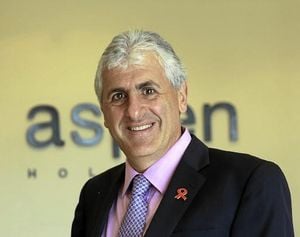On April 14, 2025, a star-studded crew of women, including pop icon Katy Perry, embarked on a historic journey into space aboard Blue Origin's NS-31 mission. This all-female flight, which also featured notable figures like Gayle King, Lauren Sánchez, aerospace engineer Aisha Bowe, activist Amanda Nguyen, and film producer Kerianne Flynn, was celebrated as a significant step for female empowerment in the realm of space exploration. However, the mission has faced considerable backlash from fellow celebrities and the public alike, raising questions about the environmental implications and the perceived extravagance of such a venture.
The mission was heralded as a groundbreaking event, marking the first all-female flight crew since Soviet cosmonaut Valentina Tereshkova's historic solo journey in 1963. Yet, as the crew prepared for liftoff, critics emerged, decrying the flight as a lavish display of wealth and privilege. Emily Ratajkowski, known for her outspoken views, did not hold back in her condemnation. In a TikTok video, she expressed her disgust, labeling the launch "end time sh*t." She questioned the environmental integrity of a mission funded by a billionaire, stating, "Saying that you care about Mother Earth and that it’s ‘for Mother Earth,’ and you’re going up in a spaceship built and paid for by a company that’s single-handedly destroying the planet?" Ratajkowski continued, "Look at the state of the world and think about how many resources went into putting these women into space for what?"
Alongside Ratajkowski, actress Olivia Wilde also chimed in, sharing a meme on social media that poked fun at the extravagant nature of the mission. She posted a photo of Perry kissing the ground after landing, captioning it, "Billion dollars bought some good memes I guess." Olivia Munn echoed similar sentiments during an appearance on the show Today With Jenna and Friends, branding the mission as "gluttonous" at a time when many Americans struggle with basic necessities. "What are you guys gonna do up in space?" she questioned, highlighting the disconnect between the wealthy elite and the struggles of everyday people.
Despite the criticism, the mission's defenders, including Gayle King and Lauren Sánchez, argued that the flight aimed to inspire young women and highlight their contributions to aerospace. In an interview with CBS Mornings, King stated, "Many people think that if you’re devoting resources, you’re taking things away from Earth. It isn’t an either-or. It’s a both-and." Sánchez, who is also engaged to Blue Origin founder Jeff Bezos, echoed this sentiment, asserting that the mission was designed to uplift and motivate future generations of women in science and technology.
Adding to the complexity of the narrative, Katy Perry's space journey came amid a legal battle involving a disabled veteran named Carl Westcott. Westcott, who sold Perry a $15 million mansion in 2020, has been embroiled in a lawsuit against the singer, claiming he was misled during the sale process. His son, Chart Westcott, expressed skepticism about Perry's newfound "connection to love" after her space trip, questioning if it would lead to greater compassion for disabled veterans like his father. "I am glad she made it back safe and look forward to having her testify in August and be held accountable for her actions against my family," he remarked, underscoring the ongoing tension surrounding Perry's public persona.
As the world watched the launch unfold, Perry's daughter, Daisy, was present at the West Texas launch site, donning an astronaut outfit and cheering for her mother. Following the flight, which lasted approximately 11 minutes, Perry reflected on the experience, stating, "This experience is second to being a mom. That’s why it was hard for me to go because that’s all my love right there, and I have to surrender and trust that the universe is going to take care of me and protect me and also my family and daughter." She also brought a flower representing her daughter into space, a poignant symbol of her dual roles as a mother and a trailblazer.
In the aftermath of the mission, the reactions continued to pour in. Many social media users criticized the flight as a form of "performative feminism" and "absolute narcissism," questioning the motivations behind such a high-profile endeavor. Even fast-food chain Wendy's joined the conversation, tweeting in response to Perry's return from space, "Can we send her back?" referencing her hit song "I Kissed a Girl." This playful jab encapsulated the mixed feelings surrounding the mission, which, while historic, has also been perceived as a stark reminder of the disparities between the privileged few and the broader societal challenges faced by many.
As the dust settles on this high-profile space mission, it remains clear that the intersection of celebrity culture, environmental concerns, and social responsibility continues to spark debate. With climate anxiety on the rise and the optics of luxury space travel under scrutiny, the mission has undoubtedly struck a nerve, prompting a reevaluation of what it means to celebrate progress in the 21st century. As public figures and everyday citizens alike grapple with these issues, one thing is certain: the conversation surrounding space travel, empowerment, and accountability is far from over.







